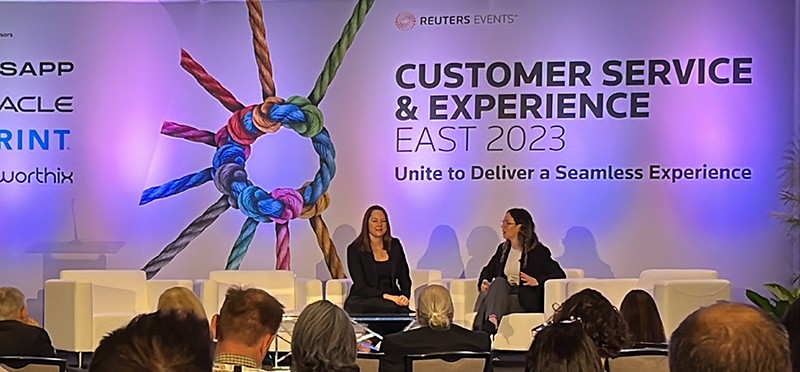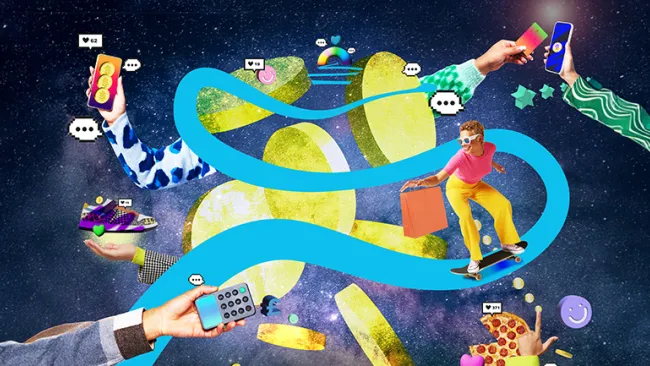With so much change amid the customer experience (CX) landscape, brands are embracing great opportunities – and some challenges – as they navigate it all.
CX leaders are grappling with the rapid rise of AI tools, the need to embrace digital while maintaining a human touch, growing associate burnout, and continual pressure to cut costs and demonstrate ROI wherever they can.
These were just some of the topics discussed at Reuters Events’ Customer Service & Experience East 2023, a recent two-day event in Brooklyn, N.Y., where CX professionals heard from industry leaders (and each other) about what’s on the horizon.
‘Automate the easy, service the complex’
A prevailing theme that kept emerging was the need for companies to strike the right, careful balance between AI and the human touch, both of which are essential for great CX.
In a session about generative AI, Assurant President of U.S. Connected Living Jeff Unterreiner said brands need to start with their customer experience in mind and implement AI from there.
The company, which provides insurance for personal items, is using AI to make customer interactions as easy as possible, he said. If a customer needs to get a broken smartphone repaired, for instance, AI will tell an associate the closet brick-and-mortar location that is open at that time and has the rights parts in stock to fix the phone. With this information in hand, the associate can help the customer quickly.
Assurant’s also using AI to generate associate responses and post-call summaries, with great success. Unterreiner said AI-generated suggestions have an 80% usage rate by associates, and with AI the company has seen a 15% rise in CSAT as associate efficiency has doubled.
But as powerful as AI is, humans remain an important part of the CX equation. In a separate presentation, Keith Farley, senior vice president of individual benefits at Aflac, said a key to delivering great experiences is to “automate the easy, service the complex.”
Use automation and self-service options so customers can help themselves when it comes to simple inquiries, he said, and automate rudimentary tasks that take up associates’ time unnecessarily. But remember most customers still prefer to interact with an associate for more complex, urgent, or emotional matters.
“If you’re truly customer-centric, it’s not about being just digital-first,” he said. “It’s about giving customers what they want.”
And Casey Denby, vice president of sales at Zenarate, noted in another session that while 75% of consumers prefer digital and self-service options when possible, it’s still humans who achieve meaningful resolutions.
ROI begins to trump KPIs
Another hot topic at the event was how challenging it can be to demonstrate the ROI of investing in CX. In a roundtable discussion, CX leaders from various brands (in the retail, quick-service restaurant, automotive, media, and fashion industries, among others) said their C-suites want to know the ROI of CX efforts, but it’s hard to quantify.
While it’s easier to make the connection between CX investments and KPIs, likes improved NPS and CSAT, attendees said it’s often difficult to translate them into concrete financial impacts.
But it makes sense for brands to prioritize ROI over KPIs, said Denby, speaking as part of a panel. With many companies trying to cut expenses wherever they can, CX teams need to make their case by positioning CX investments as ones that will generate savings, efficiencies, or other ROI down the road, he said.
Associate wellness moves to the forefront
The frontlines of any contact center are still the associates, and companies should be focusing on them more – not just retaining them, but ensuring they’re happy in their jobs, experts said.
As more simple and repetitive tasks become automated it means many associates are exclusively handling emotional, nuanced, or complicated interactions, which can be draining. And their jobs increasingly require them to be empathetic, which can lead to “compassion fatigue,” according to Dr. Grant Brenner, a psychiatrist at Mt. Sinai Beth Israel in New York City.
Associates’ jobs are harder than ever, making them more prone to burnout, he said. Left unaddressed, burnout can lead to absenteeism, lost work, depression, substance abuse, and medical problems.
It’s important for associates feel like valued members of the team, he said. Ask for (and use) their input, take their feedback into account, and prioritize associate wellness, he advised.
CX keeps evolving
Other topics on CX leaders’ minds included prioritizing CX throughout the customer journey, using technology to stay cost effective, breaking down organizational silos, and making the most of data, among others.
Here are few snippets of what people had to say:
“CX is about getting your customers to convenience.” – Casey Denby, vice president of sales at Zenarate
“If you don’t have good data, there’s no AI.” – Chandu Nair, senior vice president of data, analytics and computational intelligence and marketing technology at Lowe’s
“You can’t forget that the A in AI stands for ‘artificial.’ Sometimes you want it to stand for ‘authentic.’” – Keith Farley, senior vice president of individual benefits at Aflac
“Generative AI doesn’t automate jobs…it automates tasks.” – Chandu Nair
“Companies do not disrupt one another. They are disrupted by customers who choose to go somewhere else.” – Guilherme Cerqueira, CEO of Worthix

















